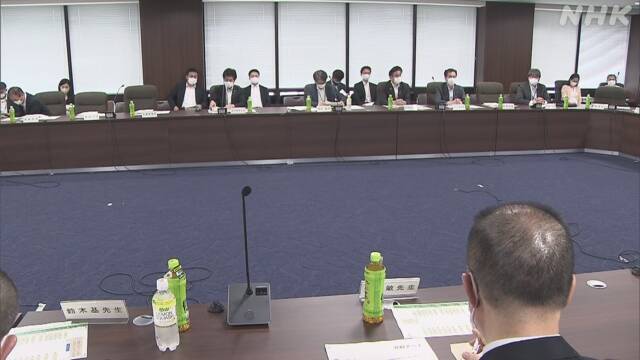As the deadline for the state of emergency approaches the 20th of this month, an expert meeting of the Ministry of Health, Labor and Welfare was held to advise on measures against the new coronavirus.
Regarding the infection situation nationwide, he said, "The number of people who are seriously ill and the number of people who die is decreasing." He emphasized that measures should be continued, saying that the number of people continues to increase and there is a strong concern that the infection will spread again from the younger generation.
According to the expert meeting, the number of people who are seriously ill or dying is decreasing in the areas where the infection was spreading nationwide, and the burden on the medical system is also decreasing overall. We evaluated that the effects of priority measures such as the declaration of an emergency and the prevention of spread are steadily appearing.
On the other hand, due to the influence of the mutant virus "Alpha strain" confirmed in the United Kingdom and the mutant virus "Delta strain" confirmed in India, it is expected that the infection will spread faster than before, and the number of people is already increasing. There are areas that have turned to, and he continued to call for caution as the re-emergence of the infection could occur.
Among the areas where emergency declarations have been issued, in Okinawa Prefecture, where infection and medical pressure are the most serious, the number of infected people is declining and the number of home care workers is also decreasing, but the bed usage rate is high. So, the number of infected people per 100,000 people in the last week is still very high, exceeding 60 people, and it is necessary to keep an eye on future trends.
In Hokkaido, although the number of infected people continues to decrease, the number of infected people is particularly high in Sapporo City, the bed usage rate is high, and the number of people at night is increasing, so caution is required. It is said that.
In the Tokyo metropolitan area, Tokyo, Saitama, Chiba, and Kanagawa prefectures, the number of infected people is higher and the rate of decrease is slower than in Kansai, and especially in Chiba and Kanagawa prefectures, they are almost flat.
In particular, in Tokyo, the number of people has increased at night and during the day for five consecutive weeks and is returning to the level before the state of emergency was declared, and if this trend continues, there is a strong concern that the infection may spread again. We are calling for caution as it will be done.
In addition, the number of "Delta strains" confirmed in India is increasing in various places, and there are reports that they are being replaced overseas, which has been confirmed in the United Kingdom and has become mainstream in Japan. Since it is suggested that the infectivity may be higher than that of "Alpha strain", it is pointed out that it is necessary to reinforce the tests conducted in the area and proceed with the investigation to investigate the infection route.
In addition, expert meetings are expected to increase vaccination and reduce the severity of the elderly, while vaccination will continue if the infection re-spreads and the number of infected people continues to increase rapidly. He emphasized that measures should be continued in the future as the number of non-existent people and the number of severely ill people in the relatively young generation will increase, which may lead to tight medical care.

